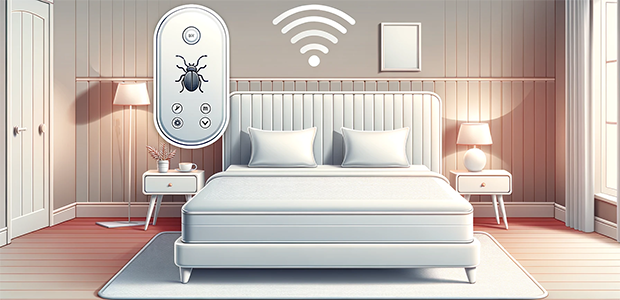
Revolutionising bedbug detection with technology
Amid rising outbreaks of bedbugs across the UK and France, people are turning to technology to catch outbreaks early.
In the realm of pest control, early detection is paramount. Bedbugs, in particular, can be a significant concern for the hospitality industry, causing not only discomfort for guests but also potential reputational damage for establishments.
Enter Spotta, a UK-based startup, which is harnessing the power of technology to address this challenge.
Spotta has developed a smart monitoring system specifically designed to detect bedbugs. The system employs advanced sensors coupled with artificial intelligence to identify these pests at their earliest stages.
How it works
At the heart of Spotta's system is its array of sensors. These sensors are designed to detect minute changes in the environment, such as heat signatures and movement. Bedbugs, like all living organisms, emit a distinct heat signature, especially when they move or feed. By constantly monitoring these factors, the sensors can pick up the presence of even a single bedbug.
The raw data from the sensors is processed using Spotta's proprietary AI algorithms. These algorithms are trained on vast datasets of bedbug activity, allowing them to discern between genuine bedbug signatures and false positives. This ensures that the system's detection is both accurate and reliable.
Unlike traditional methods that rely on periodic checks, Spotta's system offers 24/7 monitoring. This is crucial because bedbugs can be active at any time, and early detection can make the difference between a minor issue and a major infestation.
The data from each monitoring unit is sent to the Cloud, where it is stored and analysed further. This offers several advantages. Firstly, it allows for remote monitoring, meaning establishments can keep an eye on the situation from anywhere. Secondly, it provides a historical record, which can be invaluable for understanding patterns and planning future prevention strategies.
In the event that the system detects bedbug activity, it sends out automated alerts to the concerned parties. This ensures swift action, reducing the window between detection and intervention.
Spotta's system comes with an intuitive interface that allows users to monitor the situation in real-time, view historical data, and receive actionable insights. This makes it easy for even those without a technical background to utilise the system effectively.
By focusing on early detection, Spotta's system reduces the reliance on widespread chemical treatments. This not only reduces costs but also minimises the environmental impact, aligning with a more sustainable approach to pest control.
For the hospitality sector, this technology is not just about pest control; it's about maintaining a brand's reputation. A single incident related to bedbugs can lead to negative reviews and decreased bookings. By incorporating Spotta's solutions, hotels and other accommodations can offer guests peace of mind, knowing proactive measures are in place

